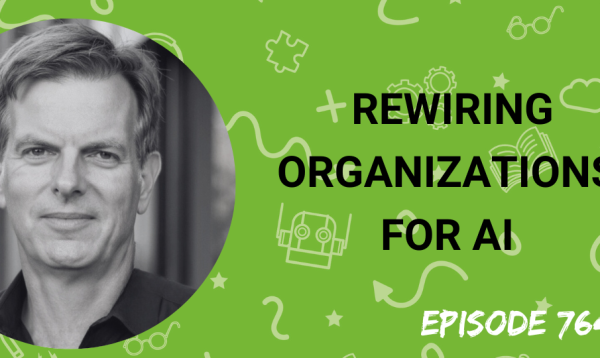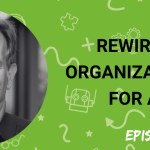I was looking back through the past episodes of the show recently, and I realised that very few of them had been dedicated to the critical evolution of methods and technology in assessment.
To help me put this right my guest this week is Bas Van De Haterd. Bas is an independent consultant and self-declared professional snoop. He has spent the last couple of years doing a deep dive into emerging assessment technologies and has some fantastic insights to share.
In the interview we discuss:
• How a real-life selection problem prompted his research
• The limited predictive value of the CV
• The difference in the speed of evolution and the rate of adoption of assessment technology
• Why traditional assessment methodologies are not scientifically valid
• The four categories of assessment tools
• Examples of companies who have abandoned CVs for a more up to date approach
• Advice to employers on choosing and implementing new methods of assessment
Bas also gives us his view on the future and explains why integration will be crucial.
Subscribe to this podcast on Apple Podcasts
Transcript:
Matt Alder [00:00:00]:
Support for this podcast comes from Avature ats, an applicant tracking system that redefines user experience for candidates, recruiters and hiring managers. Just listen to one of the many ways in which L’Oreal USA has improved their hiring process with Avature, as told by Edward Dias, Director of Recruitment, Intelligence and Innovation.
Edward Dias [00:00:25]:
Since we’ve been using Avature ATS globally, we have been able to massively improve our communication rate with candidates during and following their application. Before, over a million people worldwide would never get contacted, but with the smart automation and flexible processes, we’ve been able to change that and that’s been a huge achievement.
Matt Alder [00:00:48]:
Visit avature.net that’s a V A T U R E.net to learn why global market leaders like L’Oreal choose Avature to extend the candidate experience. From shoulder taps to first day.
Matt Alder [00:01:22]:
Hi everyone, this is Matt Alder. Welcome to episode 147 of the Recruiting Feature podcast. I was looking back through the past episodes of the show recently and I realized that very few of them have been dedicated to the evolution of methods and technology in assessment. To help me put this right, my guest this week is Bas Van De Haterd. Bas is an independent consultant who has badged himself as a professional snoop. He spent the last couple of years doing a deep dive into emerging assessment tools and has some fantastic insights to share. Hi Bas, and welcome back to the podcast.
Bas Van De Haterd [00:02:04]:
Thank you. Pleasure to be here, man.
Matt Alder [00:02:06]:
A pleasure to have you back on the show. For those people who don’t know you, could you just introduce yourself and tell everyone what you do?
Bas Van De Haterd [00:02:13]:
Well, my name is Bas Van De Haterd. I’m Dutch. My business card says I’m a professional snoop, which basically means I put my nose into everything I find interesting on the entire talent and mostly talent acquisition spectrum. I’ve been running a Dutch research on the candidate experience, digital candidate experience, for over a decade now and the last couple of years I’ve been fascinated by all the new assessment technology that’s out there which helps us select better people.
Matt Alder [00:02:47]:
So you, you know, as you say, you’re kind of best known for the digital candidate experience and you know, you’ve run a very sort of series of successful events on all around what employers do with their, with their career sites and, and some awards as well. So why, why did you sort of choose to look into the whole area of assessment?
Bas Van De Haterd [00:03:08]:
Well, I’ve been focusing mainly on Getting in as many candidates as we could by improving your recruitment side, writing better vacancies and it just, in many cases it improved the number of applicants dramatically. And then you’ve got a selection problem. I think it’s probably best described by an actual situation I was involved in last year. I was doing an interim stint at a university. We used textio to rewrite a specific vacancy for a PhD job which they expected to have very few good applicants on. We also improved the candidate experience on the website a bit and all of a sudden we had like 240 people applying to the job and then we had a selection problem. And now if you’re looking at starting jobs, which is PhD but also traineeship is a resume already has very few, very little predictive value about how well somebody’s going to perform. But when somebody just graduated, there is no predictive value in there whatsoever. So we needed to look at something else. And one of my projects there is now actually looking at what data does predict a good PhD. And assessment tooling is one of the pieces that you need in there now.
Matt Alder [00:04:40]:
You know, I’ve known you for quite some time and I know that when you, when you kind of get your teeth into looking to something, you, you know, you do it in kind of, you know, great detail to great effect. So I mean, can you sort of tell us, you know, what have you find out, what have you found out about the assessment marketplace? You know, is it something that’s changing as rapidly as other areas of recruiting and recruiting technology?
Bas Van De Haterd [00:05:07]:
Well, as far as the technology goes, it’s changing even faster than most of it. As far as adoption goes, it’s not changing as fast as it should. It’s probably changing at the same rate on we’re at early stage when it comes to adoption. So what I found was that the old way of assessing is actually scientifically not that valid. If you look at the questionnaire based assessments, there’s a lot of things to do about them. Recently the Guardian wrote an excellent piece on how they were actually sexist. That the exact same answers for men gave different outcome as character was derived for a woman. Which is of course amazing. And one of the most important pieces of research I found in the last couple of years was that if an assessment is done, a questionnaire based assessment is done for development purposes, the the outcome is different than when it’s done for application purposes. Which means that you can’t really validate on these are good people working for us. You know, these are our best account managers or our best recruiters and that’s the character they need. And then we ask people who are applying to give us an assessment of their character. But it turns out the applicants are usually more, to put it in colors, more blue and more red, more task and more goal oriented than they actually are. So what I was looking for was is there a better way to assess? And next to that the main question is do you actually want somebody having half an hour to 45 minutes answering really boring questions? And the answer was yes, there is. And there are actually. I’ve kind of put them into four quadrants of tooling. The one is the really specific job centric tasks. So you can have a developer, an IT developer do a development task and see if he can actually program, which is very task specific, really cool for some things. One of the tools I love in this piece is Harvard. They do it mainly for call center jobs and they manage to reduce the attrition from over 100 to less than 20% everywhere they are implemented. So if you’re talking about implementation, the low end jobs like call center and retail sales, it’s big there, the high volume jobs. Another piece of really interesting technology is the linguistic based. Another part I am really into is the micro expression. And the fourth one is the game based technology, which all three of them are much less manipulable. So to say you can’t really be anyone else than you are with this technology. We don’t know how to make ourselves look better. So you get a more truthful experience, a more truthful report about the person applying and usually it’s more candidate friendly as well. So that’s why I’m really into this. I love matching actual talent to actual jobs.
Matt Alder [00:09:03]:
So you mentioned those sort of three other types there, linguistic, micro expression and gaming based assessments. Could you just give us a quick overview of each of those categories? Everyone can kind of understand what’s meant by that.
Bas Van De Haterd [00:09:19]:
Well, micro expressions, let’s start with those. It has to do with your facial expressions, but not the expressions we can see with the naked eye. So not the blinking. But to give you an example, my left eyebrow really vibrates in certain situations, but it does that in 0.3 seconds. So the bit rate of your eyes is too slow to see it. But if you have a video that goes frame by frame, it’s noticeable. Together with the fact that my right corner of my mouth twitches a bit, it means I can be very unpredictable to certain other character types. If you put all of those together, and there’s really a lot of research and it’s not as easy as explained it right now, but you know, this is dumped down. You can actually make a complete character assessment about somebody’s natural way of communicating. And it’s really good for example to look if you want a diverse team with main character traits. So in an HR department you want some people who are human centric, but you also want some people who are analytic centric and you want some people who are, let’s get this thing on, you know, doing it centric. You can actually assess those, but you can also assess the potential communication problems they will have and address them before they have them. That’s why I love micro expressions. And the beauty is candidate journey wise. It takes you about three minutes of video, so it’s really easy to do in an application. The linguistic version looks at how you write things, not as much what you say a bit, but the type of words you use. So do you use a lot of verbs? Do you use a lot of I or more we? And it’s a really interesting way of looking at the way it works. Your character is directly linked to the type of words you use. So based on that you can actually, by having somebody write a few sentences, about 150 words, you can have a character assessment of those people on the big five and the fourth one or the third one, depending on how you want to say it, is the game based. You actually have somebody play a game and the way you play those games tells you a lot about the person as well. And these game based have both psychometric traits they can measure but also cognitive traits. And to give you an example, and I know you have a lot of UK listeners who in general are very soccer minded, a few of the Dutch professional teams actually use a game based assessment now to put youth players on different positions of the field because the way their brain works, they’re better suited as a defender or as an attacker or as a defensive midfielder, for example, in my case, because I tested all of these, it for example said I would be lousy as defender because when I make a mistake I always keep on blaming myself. So when I lose a ball, I first start blaming myself for a few minutes and then probably the opponent has scored already. So it literally said you shouldn’t be a defender. Yet my anticipation is really high and I also have really good. I’m really quick to process new information. So I would be very well mentally playing as a spielmarker, so to say as a offensive midfielder. Yet of course I lack all physical skills to be any good Soccer player, but mentally I would, my brain fits perfectly at what we call the 10 position.
Matt Alder [00:13:19]:
I mean that’s, there’s some fascinating stuff there, you know, not, not just about your, your mental tendency to soccer positions and your left eyebrow. Eyebrow, which was, which is really interesting. But, but, but I suppose, you know what, the question that a lot of people will ask is about the actual effectiveness of some of these, some of these techniques, you know, all, all of which to a greater or lesser extent are driven by technology. You mentioned that, you know, adoption is perhaps slow in this area. You know, do these actually work in practice? Do we, do we have evidence that they can help people, you know, find the right talent for their organization?
Bas Van De Haterd [00:14:07]:
Absolutely, absolutely. One of the problems of course, with measuring did we find the right talent is the definition of the right talent, which most people don’t have any definition of quality of hire. But if I look at, for example, Harvard, which I mentioned before, if your attrition goes down from over 100 to under 20%, you’re saving millions. So that’s the best case. I know. For example, Unilever is using both micro expressions as well as game based assessments for their traineeships. And what I’ve heard is that Grant Thornton in the UK is using gamified or game based tests for their internships. And what they’ve noticed is that they are getting a much more diverse group of people, mainly not as much diverse as in ethnicity, but also from, well, the wrong end of the street, people who didn’t have rich parents. And it turns out these people are actually as good or even better at the end of the traineeship and they stay longer at the company and they have higher margins and higher turnover than the other than the normal people they hired based on resume, based on their academic credentials. So what Grant Thornton actually told me is that they’ve cancelled the entire ID of the resume for their internships. They don’t even look at if you’ve graduated anymore.
Matt Alder [00:15:42]:
No, it’s really interesting stuff actually and it’s certainly something that I’ve been seeing a lot of. In fact, when we were researching the book, we looked at, you know, some of the, the evidence around these sort of new, new ways of assessment and there is some really interesting, really interesting things out there. I suppose my next question is that, you know, lots of employers will kind of be, you know, probably will have been very settled for a number of years on the type of, you know, assessment tests that they, that they do and you know, many may be looking to sort of change and Looking to sort of research this, you know, this new brave new world of assessment technology. What would your advice be to an employer who’s looking to kind of review, review how they do this and the technology they use? I mean, what kind of questions should they ask themselves and what kind of questions should they be asking potential suppliers?
Bas Van De Haterd [00:16:40]:
Well, to ask themselves, I think the most important question you need to ask yourself is right now you’re doing the assessments, usually in the last stage of recruiting, and how many really talented people have you discarded based on the fact that they couldn’t write their right resume? Or all kinds of biases you have based on resumes? So how much more talent can we actually get in by putting the assessment, much more to the front of the reviewing process before we already deselected people? And the next question is, can we do that while financially neutral? And usually the answer is yes. But the most important one you need to ask yourself is what’s the most important quality for succeeding at this company in this job? Is it cognitive? Is it psychometric? Can we have some form of measurement of actually successful people versus unsuccessful people in certain jobs? So can we benchmark? And what they need to ask the suppliers is, can you measure this? How do you measure this? And usually all of them will say yes. But you do need some common sense and you need to ask yourself two questions. First of all, do I trust the outcome of this tool? And second of all, will our applicants trust the outcome of this tool? That’s why, for example, at the university, we discarded the linguistic based one because we were afraid that many people, despite the fact that there’s already 70 years of academic research into this, it’s so unknown that we were very afraid that the potential PhD candidates would not trust the outcome. And that’s an important part as well.
Matt Alder [00:18:51]:
Absolutely. That makes perfect sense. I think it’s great advice. So just a final question. In your research, what did you know? What did you find out about where we’re going next? Obviously a lot of this stuff is pretty advanced already, but I’m sure that there are, you know, interesting developments in the pipeline, whether that’s with, with robots or virtual reality or, you know, whatever it might be. Did you, did you kind of spot any future trends that you’re going to keep an eye on?
Bas Van De Haterd [00:19:25]:
Well, honestly, I think much of this already is future trends. And mainly where I think we’re going is actually integrating the different forms of assessment. I found in my research that every type of assessment, like linguistic, has its pros and its cons. Game based has its pros and its cons. Micro Expression has its pros and its cons. And if you put them all together, you’ll have a total picture. And I think that’s where we’re going right now. And I think we’re also going to a more seamless integration with the normal world. So you don’t actually need to have somebody write something. You might be able to get his social media postings or other things he or she has already written and make a profile out of that. I know that somebody once did microexpression profile for me based on videos I had online from giving lectures, which basically means I don’t even have to answer the questions. You can just assess me, which does bring up some GDPR and privacy issues of course. And if you then have me play some games, you will have a complete and total picture of who I am. I think that’s where we go into as far as the virtual reality assessments are really cool at. I’ve seen some really nice ones of actually feeling what it’s like to be discriminated. I’ve seen a really cool one from about you put on your VR glasses, you’re in a meeting room and all of a sudden somebody asks you, you know, your task is to chair the meeting and somebody walks in and says have you got the coffee yet? And then you walk by a mirror and you see you’re a woman and all of a sudden you are treated like in general a woman is treated in a meeting. Which is really amazing for a man to experience, I can tell you.
Matt Alder [00:21:41]:
Interesting. That is really interesting. So are you publishing this research anywhere? Can people find it? And also where can people find you online?
Bas Van De Haterd [00:21:52]:
Well, I’ve made a map of all the tools which are available there and there is going to be live soon. As soon as I also have an English language site on Van De Hato NL, that’s my last name. Right now it’s on LinkedIn and I’m going to be talking about this a lot at the Social Recruiting days in October in Berlin and of course September 20th there’s ta live talent acquisition live in Amsterdam. And if somebody meets me at Unleash in Amsterdam, I’m there as well.
Matt Alder [00:22:22]:
Bas, thank you very much for talking to me.
Bas Van De Haterd [00:22:24]:
Thank you Matt.
Matt Alder [00:22:25]:
My thanks to Bas. You can subscribe to this podcast in itunes or via your podcasting app of choice. The show also has its own dedicated app which you can find by searching for Recruiting Future in your app store. If you’re a Spotify user, you can also find the show there. You can find all the past episodes@www.rfpodcast.com on that site. You can also subscribe to the mailing list and find out more about Working with me. Thanks very much for listening. I’ll be back next week and I hope you’ll join me.








